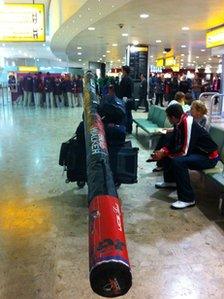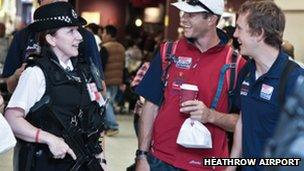London 2012: Athletes arriving for Olympic Games
- Published
Jon Kay reports on how Day One of London 2012 went at London's Heathrow Airport
Athletes and officials are arriving at the Olympic Village, with 11 days to go until the London Games open.
Heathrow Airport is expecting its busiest day on record and on the main route out - the M4 - the first priority "Games Lane" is in operation.
Work is also starting at the lab which will conduct some 6,000 drugs tests.
Meanwhile, it has emerged police have had to deploy extra officers from eight UK forces at short notice to help with security work for London 2012.
This follows the news last week that 3,500 troops had been drafted in to plug gaps after private security firm G4S failed to recruit enough guards for the Games.
In the Commons, Home Secretary Theresa May answered an urgent question on Olympics security from shadow home secretary Yvette Cooper saying that it was "untrue" that ministers knew last year that there would be a shortfall in the numbers of security personnel they had been promised.
"G4S repeatedly assured us that they would overshoot their targets," she said.
Mrs May said the government had taken immediate action after becoming aware of the shortage last Wednesday.
Metropolitan Police Assistant Commissioner Chris Allison said: "Whilst some of the activity police officers are undertaking was not anticipated, plans were put in place to allow us to do this.
"Forces are making sure they make the best use of their resources locally to do all they can to minimise the impact on local policing."
The forces involved include Dorset, Surrey, Hertfordshire, Northumbria, South Wales, Strathclyde, West Midlands, Thames Valley Police, and Greater Manchester Police.
In Salford, <itemMeta>news/uk-18856922</itemMeta> turned up for work at an Olympic team hotel and front-line officers had been pulled in to cover, the chairman of the Greater Manchester Police Authority said.
G4S said measures were being taken that should lead to the withdrawal of officers from private security roles "over the coming days".
Passengers record
Heathrow Airport is expecting to process as many as 236,955 passengers on Monday, which would surpass its previous record of 233,562 set on 31 July last year. This compares with 190,000 passengers through Heathrow on an average day.
Some 335 competitors are expected on Monday, as part of 1,027 so-called "Games Family" arrivals (including athletes and coaches) from more than 50 countries. Heathrow operator BAA expects the busiest day for arriving athletes to be 24 July.
"Today heralds the start of Britain's biggest peacetime transport challenge and Heathrow's busiest ever period," said BAA's head of Olympic and Paralympic planning, Nick Cole.
Volunteers have been directing athletes to the coaches and trains taking many of them to the Olympic Village in Stratford, east London, which opened on Monday.
Two-time 400m hurdles world champion <link> <caption>Kerron Clement claimed on the website Twitter</caption> <url href="https://twitter.com/KerronClement/" platform="highweb"/> </link> that his coach to the village had become lost for four hours.
The American tweeted: "Um, so we've been lost on the road for 4hrs. Not a good first impression London."
The village will house 16,000 athletes and officials at its peak.
Those leaving the airport by road should benefit from the first of the <itemMeta>news/uk-england-london-18850578</itemMeta> between Junction 3 and Junction 2 of the M4 motorway towards London.
The rest of the 30 miles of dedicated lanes in the <link> <caption>Olympic Route Network (ORN)</caption> <url href="http://www.bbc.co.uk/news/uk-16583939" platform="highweb"/> </link> will be operational by the middle of next week, with heavy fines for those who misuse them.
All road users will be able to go into the lanes when they are not in use overnight.

Heathrow has made provision for oversized baggage - like this polevault
Sports Minister Hugh Robertson said the authorities had plans to lift the restrictions if they were causing gridlock.
Kevin Delaney, from the Institute of Advanced Motorists, said the lanes could exacerbate traffic problems in the capital.
"If anything goes wrong with the central and inner London transport network, we tend to get a wholly disproportionate amount of congestion - and so the Games lanes themselves will actually impose serious constraints on this already stretched network," he told BBC Radio 5 live.
The biggest anti-doping operation in the history of the Olympics is also beginning at the London 2012 laboratory.
Half of the competitors will be tested including every medallist at the Olympics and Paralympics.
G4S chief executive Nick Buckles is due to appear before the Home Affairs Select Committee on Tuesday to answer MPs' questions about the firm's failures over the Games.
The company has said it stands to lose up to £50m on the contract, worth a total of about £280m, after being unable to provide the 10,000 staff it had been contracted to deliver.
BBC political correspondent Robin Brant says Labour thinks there are "serious questions" for Mrs May over the extent to which the Home Office had oversight of the contract.

Some 335 competitors are expected at Heathrow on Monday, as part of 1,027 'Games Family' arrivals
Defence Secretary Philip Hammond is also expected to deal with some of the implications for troops when he responds to MPs' questions in the Commons later.
Mrs May said she was only made aware of the scale of the problem at G4S on Wednesday.
Prime Minister David Cameron said the government had been monitoring potential Olympics problems since taking power in 2010.
"Obviously the G4S issue, the full extent of that didn't come to light until relatively recently as they were going through the final stages of hiring the temporary staff," he said.
"Let me pay tribute to the soldiers who are going to do a great job of making sure we deliver a secure Olympics."
The Mayor of London Boris Johnson said: "It's absolutely vital that we get the message across these Games are going to be very safe, very secure.
"Obviously you can never be complacent about security, you can never take anything for granted - and huge amounts of work continue to be done, particularly on the intelligence side, to make sure that we have anticipated every conceivable threat - but London will be very, very safe."
And he added: "I think we are still the last moment before curtain up, and there is a bit of pre-curtain up jitters and casting around for things to talk about.
"When the athletics gets going, when the whole thing kicks off, when the opening ceremony begins, then I think a lot of these issues that we are currently now discussing will melt away."
- Published17 January 2012
- Published16 July 2012
- Published16 July 2012
- Published16 July 2012
- Published12 July 2012
- Published12 July 2012
- Published11 July 2012
- Published15 July 2012
- Published30 April 2012